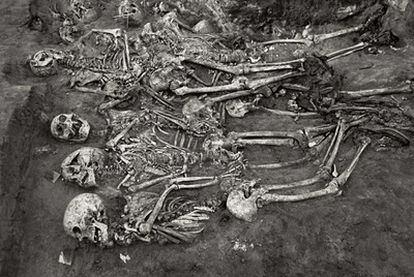War-zone witness turns gaze homeward
Photographer Gervasio Sánchez probes lingering pain from Spanish conflict
Gervasio Sánchez has made a successful career out of journeys to conflict zones across the world, training his lens on the lives of victims and the painful aftermath of modern warfare. The Córdoba-born photojournalist is perhaps best known for his images of landmine victims, many of whom he has followed as their lives are rebuilt around their disabilities, and is also a UNESCO peace ambassador.
But a challenge from a journalist during an interview, forced him to question his own modus operandi. Sánchez had justified a lack of Spanish themed work, by saying that he used time spent in his home country taking care of his family and enjoying a therapeutic break from the strain of harrowing assignments.
But when Sánchez offered that explanation as to why he had not chosen the lingering pain from Spain's Civil War as a subject, the interviewer was unimpressed. "That sounds like an excuse," came the flat reply.
"And I thought about it, and it did seem like an excuse," he told a Madrid audience last week as part of the conference series La guerra no es un espectáculo (or, War is not entertainment) at CaixaForum.
The first results of this change of tack can be seen in an exhibition of the photographer's work, Desaparecidos, at Casa Encendida, also in the capital, in which a set of images of the exhumation of a Spanish Civil War grave and the ramshackle storage of human remains in university offices comprise what Sánchez describes as an "epilogue" to a display of in-depth field work with relatives of missing persons in countries including Colombia, Guatemala and Bosnia-Herzegovina. Despite the recent and extremely destructive nature of these conflicts in countries which are all considerably less developed than Spain, Sánchez describes how the processes of recovering bodies, their storage and forensic identification is far more advanced than in his home country.
Sánchez says he plans to focus more heavily on the patchwork process undertaken in Spain over recent years to locate and identify the bodies of those executed during the Civil War. And, barring the volunteers who do the digging work, no one escapes Sánchez's ire when it comes to Spain's timid foray into historical memory, seven decades after General Franco came to power. The Zapatero government's Historical Memory Law is "a disgrace" in that it has not even established a nationwide legal framework within which to open mass graves and restore dignity to victims. Of the exhumations that have been carried out by volunteers, almost none have been attended by judges, a collective Sánchez says are just as "cowardly" as the country's politicians.
And it is not just the right which is obstructing the process, but in some cases the descendants from the Republican side. He cites the Catalan ERC's reluctance to dig into the past, perhaps due to a fear of renewed focus on some of the crimes committed by the left-wing authorities in war-time Barcelona, or the United Left, which on a national stage pushes for victims' rights but in Córdoba, "the only city where IU actually holds power," it is against excavation in the municipal cemetery. Sánchez rejects the widely held theory in Spain of a "model transition" after the death of Franco. He accepts that some issues were too divisive to be broached back then, but that excuse no longer holds. In the same way, he argues that "all wars are inconclusive" as long as the consequences exist.











































